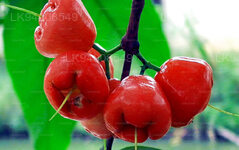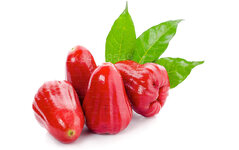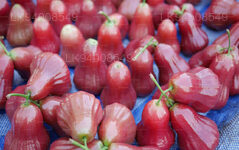Jambu ෴ ජම්බු
Syzygium samarangense also known as Java Apple, Java Rose apple is a plant species in the family Myrtaceae. The plant is native to Bangladesh to the Solomon Islands. It is commonly and widely cultivated in Malaysia, Indonesia, Thailand, Cambodia, Laos, Vietnam and Taiwan and now widely cultivated in the tropics. Common names in English include Java Apple, Java Rose apple, Mountain Apple, Samarang Rose Apple, Wax Apple, Wax Jambu, water apple, cloud apple, jambu air, bell fruit, Jamaican apple and Royal apple.
In Malaysia, there are three species which bear edible fruits, namely, the water apple (Syzygium aqueum), Malay apple (Syzygium malaccense), and wax apple or jambu air (Syzygium samarangense). S. samarangense is the most popular of the three in Southeast Asia, and the trees are cultivated in home gardens, often planted along driveways and paths. Fruit production is non-seasonal and the peak periods are in February to April and October to December. It has become an increasingly popular fruit in the tropical region where it can fetch a price of up to 3 USD per kilogram and has the potential to bring great benefit to local farmers and the country’s economy. (Note: The fruit from the Rose Apple tree is called Gulab jamun Ka Phal in Hindi. Do not confuse it with Gulab Jamun dessert.)
Plant Description
Rose Apple (Java Apple) is an evergreen tree that grows about 5–15 m tall, with short and crooked trunk, 25–50 cm diameter, with pinkish grey flaky bark, often branched near the base and with wide, irregular crown. The plant found growing in deep, loamy soil but it is not too demanding, it can also flourishes on sand and limestone with very little organic matter. Leaves are opposite, elliptic to elliptic-oblong, 10–25 centimeters (4–10 in) long and 5–10 centimeters (2–4 in) broad. Base is cordate, apex obtuse to slightly acuminate, coriaceous with thin margin, pellucid dotted, 14–19 pairs of nerve. They are strongly aromatic when bruised; petiole is stout, 3–5 mm long, yellowish green sometimes tinged with purple. Leaves are pink to dark violet when young turning to yellowish green to green with age.
Fruits
Fertile flowers are followed by bell-shaped, edible berry, with colors ranging from white, pale green, or green to red, purple, or crimson, to deep purple or even black. The fruit grows 4–6 centimeters (1.6–2.4 in) long in wild plants, and has 4 fleshy calyx lobes at the tip. The skin is thin and waxy, and the flesh is white spongy, juicy, aromatic, mildly sweet and crisp. Each berry holds 1–2 rounded seeds not larger than 0.8 centimeters (0.3 in) in diameter. The flowers and resulting fruit are not limited to the axils of the leaves, and can appear on nearly any point on the surface of the trunk and branches; when mature, the tree is considered a heavy bearer, yielding a crop of up to 700 fruits.
Despite its name, a ripe wax apple only resembles an apple on the outside in color, it does not taste like an apple, and it has neither the fragrance nor the density of an apple. Its flavor is similar to a snow pear, and the liquid-to-flesh ratio of the wax apple is comparable to a watermelon. Unlike either apple or watermelon, the wax apple’s flesh has a very loose weave; the very middle holds a seed situated in a sort of cotton-candy-like mesh. This mesh is edible, but flavorless; the color of its juice depends on the cultivar; it may be purple to entirely colorless.
Health Benefits of Java Apple (Rose Apple)
Although research is limited, some very important health benefits have been related with this unusual fruit. Let’s take a closer look at them.
Good for LDL cholesterol
‘Bad cholesterol’ or low-density lipoprotein can lead to a buildup of fatty, waxy deposits in your arteries and puts your heart at risk. Cardiovascular complications associated with high levels of LDL cholesterol include strokes and coronary heart diseases. However, the nutrients and fiber in rose apples have the ability to affect the bad cholesterol positively, boosting heart health and overall well being.
Reduce Toxicity
Given the diuretic properties of rose apples, they are traditionally used in many decoction to clear liver and kidney toxins effectively. Toxic chemicals in the body can lead to serious health issues like heart diseases, cancer, and arthritis. Water apples can remove toxic substances from the body, thus boosting the overall health and well-being of a person.
Boost Immunity
Active and volatile components in rose apple have been associated to having antimicrobial and anti-fungal effects. Research has shown that it can protect the skin from developing various infections and can boost the strength of the immune system against infectious diseases.
Control Diabetes
Jambosine is a type of alkaloid, found in rose apples, and has shown promising results in blocking or regulating the conversion of starch into sugar. This could be a very important development for someone already living with diabetes and those at risk of developing this condition. Further research is ongoing about the impact of jambosine on blood sugar control. Traditionally, an infusion of roasted seed powder was said to be helpful against diabetes.
Fights free radicals repairs the damage
Rose apple leaves have antioxidants and hence prevent free radicals from oxidizing the cells and thus causing damage to the body. Free radicals can cause many serious diseases and it is necessary to have food rich in antioxidants to restrict molecular oxidation. Both the leaves and the bark of the rose apple tree have some antioxidant properties but further research is needed in this regard.
Beneficial for skin
Skin is the biggest organ of our body. Rose apples have anti-fungal, anti-bacterial and anti-inflammatory properties that can help treat skin conditions such as acne vulgaris. Skin infections can also be treated by leaves of rose apple plant. Rose apples are also believed to have preventive actions on skin infections. Anti-oxidants in rose apples to help in maintaining optimal skin health by reducing the damage caused by stress, pollution, and poor diet. Eating water apples frequently can give you soft and supple skin, and get rid of wrinkles.
In a study for Java apple leaves, it was found to have rich cosmeceutical properties. Leaf extract was found to be rich in phenolic compounds that are protective against free radicals. Further research could make it one of the important ingredients in the skin care cosmetic products.
Aid in Digestion
High fiber content of rose apples makes them very good for regulating the passage of food through your digestive tract, relieving constipation, and more serious health conditions. Also, in traditional medicine, the seeds of rose apples have been used to prevent diarrhea and dysentery.
Prevents Cancer
Studies have shown that incorporating fruits that are rich in essential nutrients help to prevent tumors growth in several parts of the body.
Presence of vitamin C which is an antioxidant that has several key roles to play in the human body as well as vitamin A and other active organic compounds helps to prevent the body from effects of cancerous diseases. Health scientists have researched and found rose apple noteworthy in treating prostate and breast cancer.
Prevents muscle cramps
Condition of hypokalemia is caused due to low levels of potassium in the body – which forms an important electrolyte for nerve and cell functioning. The levels of potassium in the body are controlled by the kidneys, but some potassium-wasting agents can cause more potassium to get lost through urine. Rose apples are abundant in potassium and regular intake can strengthen the muscles, thus preventing muscular cramps.
Maintains a Healthy Heart
Regular consumption of rose apples also helps maintains a healthy heart by moderating the blood cholesterol level. Flesh of apples such as water apple contains natural phytochemicals, epicatechin that contributes greatly in lowering high blood pressure which can lead to stroke and other heart diseases.







